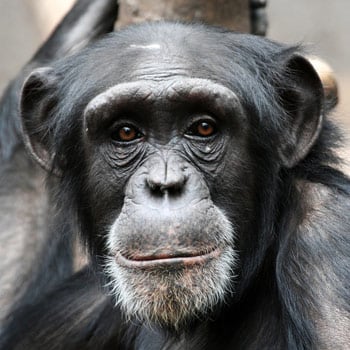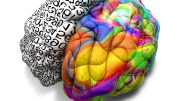
In a recent study, chimpanzees outperform humans in a two-player game, implying that chimps might possess a superior memory and strategic ability in remembering their opponent’s past choices.
In a new study, chimpanzees outplay humans in a two-player game, suggesting that chimps may have a superior memory and strategy when it comes to recalling their opponent’s choice history.
We humans assume we are the smartest of all creations. In a world with over 8.7 million species, only we have the ability to understand the inner workings of our bodies while also unraveling the mysteries of the universe. We are the geniuses, the philosophers, the artists, the poets, and the savants. We are amused by a dog playing ball, a dolphin jumping rings, or a monkey imitating man because we think of these as remarkable acts for animals that, we presume, aren’t as smart as us. But what is smart? Is it just about having ideas, or being good at language and math?
Scientists have shown, time and again, that many animals have extraordinary intellect. Unlike an average human brain that can barely recall a vivid scene from the last hour, chimps have a photographic memory and can memorize patterns they see in the blink of an eye. Sea lions and elephants can remember faces from decades ago. Animals also have a unique sense perception. Sniffer dogs can detect the first signs of colon cancer by the scents of patients, while doctors flounder in early diagnosis. So the point is animals are smart too. But that’s not the upsetting realization. What happens when, for just once, a chimp or a dog challenges man to one of their feats? Well, for one, a precarious face-off – like the one Matt Reeves conceived in the Planet of the Apes – would seem a tad less unlikely than we thought.
In a recent study by psychologists Colin Camerer and Tetsuro Matsuzawa, chimps and humans played a strategy game – and unexpectedly, the chimps outplayed the humans.
Chimps are scientist’s favorite model to understand human brain and behavior. Chimp and human DNAs overlap by a whopping 99 percent, which makes us closer to chimps than horses to zebras. Yet at some point, we evolved differently. Our behavior and personalities, molded to some extent by our distinct societies, are strikingly different from that of our fellow primates. Chimps are aggressive and status-hungry within their hierarchical societies, knit around a dominant alpha male. We are, perhaps, a little less so. So the question arises whether competitive behavior is hard-wired in them.
In the present study, chimp pairs or human pairs contested in a two-player video game. Each player simply had to choose between left and right squares on a touch-screen panel, while being blind to their rival’s choice. Player A, for instance, won, each time their choices matched, and player B won, if their choices did not. The opponent’s choice was displayed after every selection, and payoffs in the form of apple cubes or money were dispensed to the winner.
In competitive games such as this, like in chess or poker, the players learn to guess their opponent’s moves based on the latter’s past choices, and adjust their own strategy at every step in order to win. An ideal game, eventually, develops a certain pattern. Using a set of math equations, described by game theory, it is easy to predict this pattern on paper. When the players are each making the most strategic choices, the game hovers around what is called an ‘equilibrium’ state.
In Camerer’s experiment, it turned out that chimps played a near-ideal game, as their choices leaned closer to game theory equilibrium. Whereas, when humans played, their choices drifted farther off from theoretical predictions. Since the game is a test of how much the players recall of their opponent’s choice history, and how cleverly they maneuver by following choice patterns, the results suggest that chimps may have a superior memory and strategy, which help them perform better in a competition, than humans. In other words, chimps seem to have some sort of a knack when fighting peers in a face-off.
Their exceptional working memory may be a key factor for chimps’ strategic skills. A movie clip, part of a study in 2007, impressively captures the eidetic memory of a 2-year-old chimp as he played a memory masking game. It makes jaws drop to see him memorize random numerical patterns within 200 milliseconds, about half the time it takes for the human eye to blink. Memory of such incredible precision is rare in human babies and close to absent in adults, save for fictitious characters like Sheldon Cooper.
It may seem dispiriting to have chimps make chumps of us. But such human-chimp comparisons point to how the two species have evolved along different trajectories. The human brain is three times larger, and has about 20 billion neurons in the cortex, the seat of cognition, compared to 6 billion in chimps. This means that our brain is capable of highly specialized functions that a chimp brain isn’t. For example, we can build and use language in a myriad of ways unlike chimps. But, to get such an advanced brain, psychologists believe that humans may have had to “tradeoff” the fine working memory and strategic thinking of the apes. Chimps use their strategic minds to get a competitive edge over their peers and climb their way up to be the alpha male. Whereas the human brain, with its unique language-related and collaborative skills, gives us a survival advantage in an egalitarian society. It’s the result of use it or lose it, where the environment has a major say.
In sum, what we garner from these studies is that every species has its own idiosyncrasies. Evolution is not just about adding on to existing prototypes, it is about fine-tuning them by eliminating the non-essential to create newer species that are, on the whole, better adapted to their surroundings — even if, in some particular ways, they are inferior.
Reference: “Chimpanzee choice rates in competitive games match equilibrium game theory predictions” by Christopher Flynn Martin, Rahul Bhui, Peter Bossaerts, Tetsuro Matsuzawa and Colin Camerer, 5 June 2014, Scientific Reports.
DOI: 10.1038/srep05182









Be the first to comment on "Chimpanzees Outplay Humans in Brain Games"